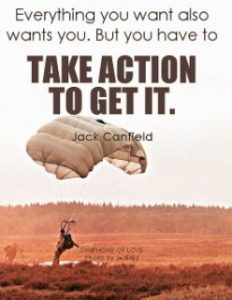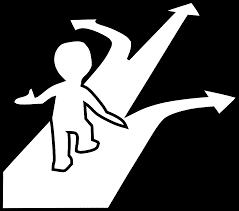This time of year, many people think about setting some New Year’s Resolutions to help them achieve the success they want. The top three New Year’s resolutions have historically been to (1) lose weight, (2) save money, and (3) get organized.
Did you know that the vast majority of people who set goals for the New Year have already given up trying to achieve them by the third week in January? They feel completely defeated and don’t even see the point in trying.
As you examine what prevents you from achieving the success you want—personally or professionally–what’s holding you back? Do you blame lack of money or not enough time, education or opportunity? Do you blame the way you were raised or an event that happened to you in the past?
You are 100 percent responsible for all success and failure in your life.
Years ago, I learned this powerful equation from my mentor, Jack Canfield, and it changed my life forever:
E + R = O (Event + Response = Outcome)
In order to change the sum–what comes after the equal sign–you must change a variable. You may not be able to change an event that takes place in your life, but you can change your response to that event. By doing so, you will change the outcome.
In other words, whatever outcomes you experience in life are a result of how you responded to events. If you want to change a future outcome, you must change your response.
The Blame Game
 When people don’t like an outcome they’ve experienced, they often choose to blame the event (E) for their lack of results (O). When things don’t go the way they want, they blame the economy, the weather, lack of education, racism, gender bias, the political climate, their spouse, their kids, their boss—anyone but themselves.
When people don’t like an outcome they’ve experienced, they often choose to blame the event (E) for their lack of results (O). When things don’t go the way they want, they blame the economy, the weather, lack of education, racism, gender bias, the political climate, their spouse, their kids, their boss—anyone but themselves.
There’s no disputing that many circumstances exist which impact your life in some way. However, if these events or circumstances were the deciding factors in whether or not someone succeeded, nobody would achieve success.
Those who blame other people or circumstances have put themselves in a self-imposed prison by making themselves a victim. They may convince themselves that they have no choice because of circumstances beyond their control.
For every person who makes an excuse and says that something is not possible, there are many others who have faced the same or even more challenging circumstances and have succeeded.
Here’s the life-altering lesson I learned from Jack: the deciding factor (O) in your success is not the external conditions or circumstances (E). It’s how you choose to respond (R) to those life events.
 One of my favorite examples of this is the story of Nick Vujiucic, who was born without arms and legs. Early in his life–after he quit feeling sorry for himself—Nick decided his life would count for something and he would make a positive contribution.
One of my favorite examples of this is the story of Nick Vujiucic, who was born without arms and legs. Early in his life–after he quit feeling sorry for himself—Nick decided his life would count for something and he would make a positive contribution.
Nick let go of regrets and excuses, and he embraced his circumstances. He acknowledged the gifts he had, and he asked for help when he needed it. He let go of limiting thoughts and self-defeating behaviors, and he transformed his life into something amazing by following his passion for helping others overcome hopelessness.
Nick has achieved incredible success as a motivational speaker and author, impacting tens of thousands of lives.
What Keeps People Stuck
Perhaps you are not consciously aware of the limiting thoughts and self-defeating behaviors that may be running your life on auto-pilot. Here are a few questions to heighten your consciousness:
- Do you ignore useful feedback and information?
Example: The guy you’re getting serious with has been married three times and you just learned through a mutual friend that all of his previous wives left him because he was cheating on them.
- Do you fail to educate yourself or learn new skills?
Example: You have just been diagnosed with diabetes and you have not done anything to educate yourself about how to maintain a healthier diet or learn new cooking skills and strategies that support a low-glycemic meal plan.
- Do you put off forming healthy habits?
Example: You want to start a daily exercise program, but for months now you’ve put it off because of pressing deadlines at work.
- Do you waste a lot of time on trivial things?
Example: You often cannot account for where your time went, and your highest priority activities are not getting done.
- Do you manage your money poorly?
Example: You spend more than you make each month, and your credit card debt is climbing. You have no savings for retirement or emergencies.
- Do you engage in unproductive and unhealthy conversations?
Example: A typical day at the office includes idle gossip and chit-chat around the water cooler. You fail to tell the truth when people ask your opinion about something because you know others may not agree. You don’t want to make any waves by asking for what you want.
We ignore useful feedback, fail to continuously educate ourselves, learn new skills, or form healthy habits. We waste time on trivial things, spend more money than we make, engage in idle gossip, fail to tell the truth, and don’t ask for what we want … and then we wonder why our lives aren’t working!
What Successful People Do
 Successful people intentionally align their thoughts, words, and actions with their purpose, values, and goals.
Successful people intentionally align their thoughts, words, and actions with their purpose, values, and goals.
Successful people feed their minds positive and uplifting thoughts that permeate their sub-conscious, where beliefs are stored.
Successful people surround themselves with other people who reflect who they want to become, and minimize their interactions with those who pull them down.
Successful people change their responses (R) to the events (E) until they get the outcomes (O) they desire.
Successful people take 100% responsibility for their own life.
Successful people set measurable goals, write them down, and review them often.
Successful people take action!
Take Action Challenge
 Here’s an exercise to help you get started. Examples are provided, although I encourage you to identify your own actions you will take to move you from where you are to where you want to be in each of the areas listed below.
Here’s an exercise to help you get started. Examples are provided, although I encourage you to identify your own actions you will take to move you from where you are to where you want to be in each of the areas listed below.
Finish these sentences:
If I were to take 5% more responsibility for my WELL-BEING…
Examples:
- I would exercise 30 minutes a day.
- I would limit fast food intake to no more than once per week.
- I would meditate for 15 minutes each morning.
- I would get 7 hours of sleep or more each night.
If I were to take 5% more responsibility for honoring my WHAT BRINGS ME JOY…
Examples:
- I would sing at least 15 minutes each day.
- I would deeply connect one-on-one with a family member or friend each week.
- I would work with middle-aged women in transition.
- I would vacation twice a year in one of my favorite spots.
If I were to take 5% more responsibility for ATTAINING MY GOALS…
Examples:
- I would do five things a day – every day – toward achieving my goal.
- I would spend an extra hour a day working toward achieving a goal rather than watching TV.
- I would share my goals with family, friends or my coach and build in accountability.
- I would do weekly planning every Sunday night for the coming week.
If I were to take 5% more responsibility for my FINANCIAL HEALTH…
Examples:
- I would reduce my overhead costs to no more than 30% of my monthly income by either moving to a less expensive place or renting out some of the space I currently have.
- I would set up a monthly automatic payment to go directly to my IRA.
- I would pay off my credit card debt.
- I would only buy things that I can pay for that month.
If I were to take 5% more responsibility for the success of my RELATIONSHIPS…
Examples:
- I would plan quality time with my kids and schedule it on my calendar.
- I would have a date night every week with my spouse.
- I would talk less and listen more.
- I would keep my agreements and only say yes when I can follow through.
If I were to take 5% more responsibility for RAISING MY SELF-ESTEEM…
Examples:
- I would ask for what I want.
- I would invest in more personal development seminars and coaching to foster a more positive mindset.
- I would create a list of my successes and review them monthly.
- I would surround myself with positive people and limit my time with people who pull me down.
Now that you’ve identified what you can do to increase your level of satisfaction in each of these areas, for the next 30 days live your life as if you were 100% responsible for everything that happens. Anything that is not the way you want it to be, ask yourself “What am I doing (or not doing) to create that?”
You Have a Choice!
 Research shows that willpower is like a muscle that can be built up or depleted. When your willpower gets depleted, that’s when autopilot kicks into full gear…unless your subconscious mind is strong enough to make small course corrections when your willpower falters.
Research shows that willpower is like a muscle that can be built up or depleted. When your willpower gets depleted, that’s when autopilot kicks into full gear…unless your subconscious mind is strong enough to make small course corrections when your willpower falters.
If your life isn’t what you want it to be—whether that’s due to a cluttered schedule, disorganized space, or disempowering thoughts that hold you back—then I want you to know you have a choice. You can choose to create new surroundings, a new mindset, and a new life. When you realize that you have a choice, you give yourself the power to create change and to direct your life.
Are you ready to make the choice, right now?
Let me help you. Let’s schedule a no-cost, no-pressure Discovery Call today!
What’s one thing you’ll take 5% more responsibility for doing over the next 30 days? Build in some accountability for yourself by sharing in the comments below.
Check out these additional resources:
- Self-Paced Course: Guide to Getting Motivated & Achieving Your Goals
- Guide: Cultivating Happiness: Living Life on Your Terms
- Guide: Find Your Strengths & Choose Your Success

Life Architect – Creating Blueprints for Purposeful & Productive Lives
Kathy@OrgCoach.net www.OrgCoach.net Follow me on Facebook





